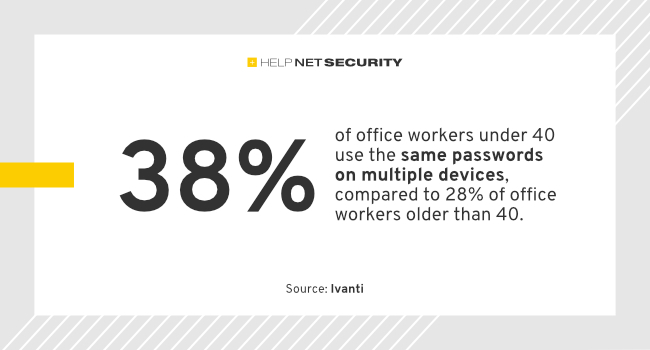One in three employees believe their actions do not impact their organization’s security, according to Ivanti.
The research also shows that Millennial and Gen Z office workers are more likely to have unsafe cybersecurity habits when compared to Gen X and older (those above 40 years of age).
This is true about performing password hygiene, clicking on phishing links and sharing devices with family and friends:
- 38% of office workers under 40 use the same passwords on multiple devices, compared to 28% of office workers older than 40.
- 34% of office workers under 40 shared work device(s) with family or friends, compared to 19% of office workers older than 40.
- 34% of office workers under 40 use a birthdate in their password, compared to 19% of office workers older than 40.
- 13% of office workers under 40 clicked on a phishing link when targeted, compared to 8% of office workers older than 40.In addition, gender, seniority and region can impact the collective strength of the organization’s security as a whole. The report finds that men and leaders are more comfortable contacting a security employee with a question or concern – with leaders at an organization the most likely to reach out with a question at 72%.
Regional variations in cybersecurity training
It also shows that there are regional variations in cybersecurity training and attitudes with 54% of employees in China and 43% in France reporting that their organizations do not provide mandatory cybersecurity training. That number drops to 17% for the United Kingdom, 30% in the United States and 22% in Germany respectively.
“Employees don’t always understand that they’re valuable members of the extended security team despite organizations best attempts to train and educate,” said Daniel Spicer, Chief Security Officer at Ivanti. “There is also a dangerous assumption that since younger office workers are generally more tech savvy, they are also more security conscious. Security leaders need to enable all employees to play defense against threat actors and proactively build an open and welcoming security culture.”
Many organizations have a top-down approach to training and cybersecurity culture; however, the research shows it’s critical to build a collaborative and positive security culture at every organization. Undertrained employees risk diluting the strength of the overall organization’s preparedness, which is why organizations need to design their tech stack to minimize end-user friction.








